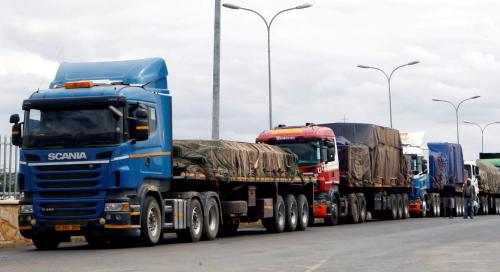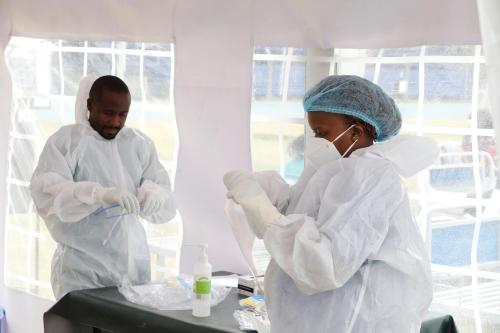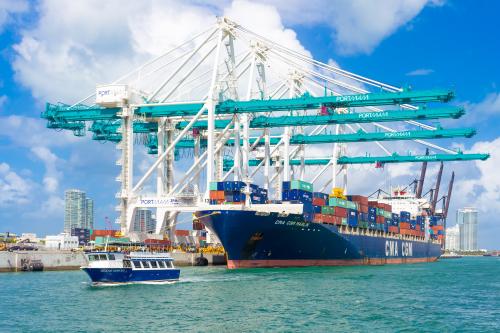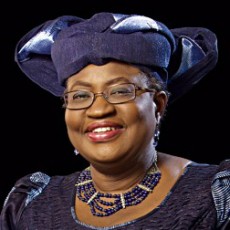Ngozi Okonjo-Iweala has served as the finance minister of Nigeria, the managing director of the World Bank, and she is currently a candidate for the director-general position at the World Trade Organization. She joins David Dollar in this episode to discuss the role trade plays in global development and what she would prioritize as director-general.
Okonjo-Iweala is a nonresident distinguished fellow with the Africa Growth Initiative in the Global Economy and Development program at Brookings.
Related content
Michael Spence on US-China competition and Industry 4.0
How to ensure Africa has the financial resources to address COVID-19
Dr Ngozi Okonjo-Iweala’s statement to the WTO General Council
DAVID DOLLAR: Hi, I’m David Dollar, host of the Brookings trade podcast Dollar & Sense. Today, my guest is Dr. Ngozi Okonjo-Iweala. She’s had a long and distinguished career: 25 years in the World Bank and she served as the finance minister of her own country, Nigeria. Now, she’s a candidate to head the World Trade Organization. It was just announced that she’s one of the five finalists. The theme of our talk is going to be trade and development. So, welcome to the show, Ngozi, and congratulations on making it to that final round.
OKONJO-IWEALA: Thank you, David. Good to see you.
DOLLAR: So let’s start by talking in general about the role of trade in development. You have that long experience at the World Bank. You worked on many different countries. How do you see the role of trade in development? Do you have some specific experiences you can share with us?
OKONJO-IWEALA: Well, David, thanks. I think trade is important to developing countries because trade is an instrument. It’s part of the arsenal of tools, if you will, with which a country approaches development. It’s an essential part of that. A good example is you can see in the East Asian countries how trade has been instrumental in the export-led growth strategies that have lifted hundreds of millions out of poverty.
In the same way, looking at other developing countries for example on my continent, Africa, we looked at programs where we could actually help the country with what I might call “behind the border” issues. How to increase investment, how to improve production and productivity of their output so that they could not only have goods they could trade within the country, but also outside the country and earn the needed foreign exchange that many of them need in order to make their economies work better. So trade is an essential part. You produce goods to trade. You produce services in these days also to trade.
I can think of specific examples. What we did, for instance, in Cote d’Ivoire during the time we were trying to help them with improving the output and productivity of coffee and the overall management of the coffee sector so that they could export more and earn more—including even macroeconomic issues like exchange rate overvaluation and trying to improve on that. So that’s one example. All over West Africa at that time, actually, in the 1990s we were working hard on trying to get the macroeconomic environment right, to get the sectoral issues visa a vis agricultural production and export right, and to help countries to export more and to trade more.
DOLLAR: In your statement to the WTO Council, you noted that it’s been a long time since we’ve really had a WTO-wide trade liberalization agreement, but there are a lot of regional agreements that are proliferating. So, what are the benefits and what are the limitations of these regional agreements?
OKONJO-IWEALA: David, well, they say a WTO D-G does not really comment on regional or bilateral trade agreements, but without commenting on any specifics I can just say that multilateral trade agreements are better because they involve all the members—164 members. They accrue benefits to all the economies of scale that accrue from multilateral agreements. And when you have all the countries around the table, transaction costs are lower.
With the bilateral and regional trade agreements, they are fine as long as they are in congress with WTO rules; as long as they lead to further liberalization between members; as long as they do not create barriers to trade that disfavor other members and create any barriers to the most-favored-nation approaches of the WTO. So this is fine, but the very proliferation of bilateral and regional trade agreements is a consequence of the lack of multilateral agreements. And as long as the WTO continues not to be able to have multilateral negotiations, this will be an incentive for countries or for members to feel, well, it doesn’t work under multilaterals, so let’s go and get regional or bilateral agreements. And I think that should not be the case.
The second thing is the WTO’s rules are not up to date as it concerns what I would call 21st-century issues. The issues like the digital economy, electronic commerce, services trade, which is growing now by leaps and bounds. Actually, trade in goods is growing at a decreasing rate, but trade in services is growing at a really rapid pace—as are cross-border data flows. So the rules need to be cognizant or take account of this. And what you find is that bilateral and regional trade agreements, some of them are very modern and at the cutting edge whereas WTO rules are not. We need to reverse that. And I’m sure that this can be done with the reforms which we know need to be done at the WTO.
DOLLAR: So Ngozi, I understand you’re reluctant to comment on specific regional agreements, but I want to see if I can get you to say at least a little bit about the African Continental Free Trade Agreement which is so important. We can make it more general about integration in Africa rather than commenting on that specific agreement, but why is it important to get more integration within Africa?
OKONJO-IWEALA: Well, actually, the African Continental Free Trade Agreement I can comment on broadly to say that, look, this is a good thing and I hope it kicks off in January—it’s been delayed a bit—because it will create such a large market. A market of almost 1.3 billion people in a continent that the middle class is rapidly coming up and there’s going to be more purchasing power. So to have such a market and integrate the continent more I think will lift up economies and incomes more. But, David, I hasten to say that this will only work if we, again, deal with some issues. Logistical issues, for instance. Crossing borders of goods and services—especially goods. Lorries spend days waiting at borders to cross over. People spend days sometimes—or hours, I would say—waiting to cross over. Until we can deal with some of these logistical issues—which have gotten worse in a way with the COVID pandemic because of the fear of truck drivers bringing this in—unless we can deal with these issues and clear away those barriers, we’ll still have problems.
I’m optimistic, though. There’s a realization on the continent that there are things we need to do in order to make the African Continental Free Trade Agreement work better. So, in short, I think if we can trade better with each other; intra-Africa trade is only 15 percent. Africa’s trade shelf…world trade has gone down from 5 to 3 percent. All of these need to be increased if the continent is to become more prosperous.
DOLLAR: I think that’s a very important point that integration within the continent is complementary to Africa having more of an economic role in the world. You’ve got a lot of landlocked countries in Africa, so if they can’t ship their goods, if Uganda can’t ship its goods across its neighbors to get access to the international market, then it’s really just closed off. So that does seem quite important.
OKONJO-IWEALA: Absolutely, David. And I think I would add to that. For the African Continental Free Trade Agreement to work, we have to add more value to our products on the continent. We can’t just continue exporting the same raw materials we’ve done over time. We have to add value. See what is happening now with cocoa in Cote d’Ivoire? I talked about coffee in Cote d’Ivoire before, but cocoa is the huge export in Ghana and Cote d’Ivoire. So, for both of those, we also need to see how they are adding value. That’s what we need, from cocoa to chocolates, and instead of exporting the raw material to be processed outside. That will create jobs. Remember, there is one thing on the continent that we absolutely have to see to: the great number of youths for whom employment has to be found. So, if we don’t add value, we can’t employ our youths and we can’t trade more with ourselves and the outside world.
DOLLAR: Let’s talk a little bit about the immediate issue of the COVID-19 crisis. It’s a terrible recession at the moment. I worry it’s going to have lasting effects on international trade and development opportunities. Are you worried it’s going to have a kind of permanent effect in terms of setting back development options?
OKONJO-IWEALA: I do think that COVID-19 is going to have some permanent impact on trade. The issue is to what extent, and what impact does that have on development as you said. Why do I say this? Now that we’ve seen the pandemic, some trends that were already in place towards protectionism and more nationalism have been heightened by the experience we’ve had with countries trying to…realizing that they need access to medical equipment and supplies. The export restrictions that were thrown by many countries which prevented others from having access. Even export restrictions on food. 90 countries had export restrictions during this COVID pandemic on medical supplies and equipment. This has created the impression that some supply chains need to be brought home.
So you’ve got countries thinking now of going from just-in-time to just-in-case, stockpiling, or just-at-home and producing some of the products, especially ingredients for medicines and others, at home. So that inevitably is going to impact supply chains. And there are some studies that show that perhaps a quarter of supply chains might be taken back into countries. So we have to consider that and know that there will be some impact. But I think all in all, even if it’s a quarter, we’ll still have 75 percent of these supply chains in other countries because they are so intricately woven. So, yes, in short, I think there will be some permanent effect. The issue is how much. But that does not mean that the multilateral trading system will not still be relatively large and robust after that the pandemic.
DOLLAR: In one of our recent episodes, I talked to Mike Spence, the economist, and he’s worried that this COVID crisis is going to accelerate trends in automation that reduce some of the development opportunities. But I think you’ve made an important point: there are going to be new opportunities developing as well in services and other areas. So it’s still a good strategy for developing countries.
OKONJO-IWEALA: I believe that this is the case; focusing on trade is still a good strategy. On the issue of automation, yes, the trend had already started towards technology. People talk about 3D printing, for instance. With 3D printing, is that going to lessen supply chains? Is that going to change the nature of trade? There are those who believe, in fact, it might expand trade. Others believe no, it might result in supply chains being brought home because it can do all these things through 3D printing. So the verdict is out; we are going to see. But as you mentioned, and I said in the beginning, actually trade in goods is increasing at a declining rate. So we need to focus on trade in services. This is where the future really is. I think this is one of the reasons I believe the WTO needs to finish negotiations on services. Get a services agreement and get the rules in place to govern this, particularly for electronic commerce. The future is going in that direction.
DOLLAR: As the U.N. meeting starts in New York relatively soon, the theme is renewing our commitment to multilateralism. I guess I want to ask you specifically about the economic side of multilateralism: how the WTO, the World Bank, the IMF, can work together better to support developing countries. You’re uniquely placed given your experience in the World Bank. Coordination with the IMF, the WTO — how can these agencies work better together?
OKONJO-IWEALA: David, the issue of cooperation among the multilateral agencies is actually a really important one. And there is some level of it going on, but I don’t think it’s enough. I think the WTO will be able to be more impactful if for certain areas of its work it can collaborate tightly with some of the other multilateral organizations. And I think this issue of multilateralism that is going to be discussed at the UNGA—the U.N. General Assembly meetings—will be very important. A strong multilateral trading system is important and delivering goods and services within it is important. But let me comment on one or two specific areas where multilateral cooperation between the agencies will be important.
If you talk to members of the WTO right now, they are engaged…many of them are engaged in plurilateral negotiations on e-commerce, but there are many members who are not. So plurilateral means that it’s not multilateral—not every member is engaging. And if you speak to many of the members not engaging who are largely developing countries, they will tell you, well, look, there’s total asymmetry of knowledge on this issue. And we don’t have the infrastructure, the physical infrastructure, to participate. We don’t have the regulatory frameworks. We don’t have the capacity. Why should we participate and take on commitments we may regret down the line? Well, this is an area where the WTO, which is not a financing agency, could easily team up with the World Bank, Asian Development Bank, Asian Infrastructure Investment Bank and African Development Bank to say who are these members? How can we work together to bridge that infrastructure divide, help them with their regulatory frameworks, and deliver on that? That’s one clear area where, if I were to be made WTO D-G, I would be looking for cooperation that would benefit members.
A second area is in trade finance. David, this is an area that is not much talked about to my surprise within the WTO framework. You cannot have trade without finance greasing the wheels. And again, my strong comparative advantage in being able to work with other multilaterals, with the IFC which can also pull in private sector finance. And as you know, since the 2008-2009 financial crisis, correspondent banking has been severely impacted. This has had an effect, particularly on poor countries, on developing countries, whose importers and exporters do not have access due to the regulatory regimes put up by developed countries. And I think from what I hear, I don’t have hard evidence, that the pandemic has even heightened this lack of trade finance for some of these countries. So, I would say that this is another area where the WTO can collaborate with other multilaterals and even with private sector banks to make sure that trade finance is available. I’m just giving you two specific examples, and the Marrakesh agreement does talk about the need for the WTO to link with other agencies and to collaborate well.
DOLLAR: I think that point about financing is very important. We’re living in this era of very low interest rates. The Fed has just more or less indicated we’re going to have zero real interest rates or negative real interest rates for five years is their expectation. And yet, a lot of developing countries can’t get access to that. So it doesn’t really mean anything if you can’t access the loans. The fact that interest rates are low in London or New York doesn’t do much for developing countries.
OKONJO-IWEALA: It absolutely does not. And that’s the irony that I’m still trying to grasp. That you have investors willing to lodge their money and pay for this, but when they look at developing countries, their assessment of risk is so high that the interest rates that these countries confront are just, in my sense, sometimes unbelievable. You still have some countries facing double digit interest rates when, at the same time, investors are willing to pack their money in Eurobonds or even in Swiss bonds and so on and pay for it. So there’s some imbalance that goes on with regard to the perception of risk and I hope that this will change vis a vis at least countries in Africa and other developing countries.
DOLLAR: So last question, Ngozi, and you’ve touched on this a little bit. If you were elected director general of the WTO, what would be some of your priorities? What do you see as the agenda in the next few years?
OKONJO-IWEALA: Thank you, David. First of all, let us say that one of the things we have to do about the WTO—I would like to do as a priority—is restore the vision of the WTO as an organization delivering for development. Trying to lift the lives of people and bring shared prosperity. A WTO with purpose.
If you work towards this vision, there are two or three specific things that would be priorities. The first is really to complete a multilateral negotiation. And we have a good example in the ongoing fisheries subsidies negotiations, which speaks to two objectives. One is sustainability. We are in the era of trying to achieve the sustainable development goals, and the sustainability of our oceans and our fisheries is very important. This negotiation, when concluded, would deliver that. At the same time, it would give the WTO a win and show the WTO is back; it can actually deliver a completed multilateral negotiation. So that for me would be a top priority at the next ministerial in the middle of next year.
A second priority would be COVID. We are in the middle of the COVID-19 pandemic, and the WTO…trade can play a very important role. There are actually WTO rules on the books that can help. In the TRIPS agreement, there is an article that states that in cases of public health emergencies, poor countries can be given a license—while still protecting the intellectual property of developers of medicines and supplies and equipment—they can have a license to manufacture these things for themselves, just for their own markets. This has not triggered. It’s not really being talked about. But when the issue of vaccines and potential therapeutics that could come on the market and diagnostics are looked at, this could be a very good way to make them more accessible and affordable for developing countries. I’m right in the middle of this COVID issue as chair of GAVI and as the WHO envoy to the ACT Accelerator where we are looking at this too, so I’m very concerned about making the WTO a part of the solution. Secondly, trade should be able to help the world come out of the recession…the global recession we’ve fallen into in virtually every country. So we should be looking at how can we make trade an instrument of recovery from the recession. So those are two things that would be a top priority for me in that regard.
In addition, the dispute settlement system, which is paralyzed at the moment, really undermines the credibility of the WTO. This is one of the main functions of the WTO. So if that aspect is paralyzed, we need to bring it back to bring back the credibility of the WTO. So working with members to put in place a dispute settlement mechanism that all members can believe in, that is impartial and independent, will be a top priority for me. And then, issues of transparency in negotiations— I want to focus on that. Finally, I’d like to say that WTO rules on the green economy, the digital economy, and the circular economy all need to be upgraded to 21st-century standards. This is really important given the way we are going with the digital economy now and given the role of climate change. That is a very, very important role. I’ll end by saying that attention to micro, medium, and small enterprises, and women in trade…continuing the work program that has been started in that area would be critically important because I also think that trade ought to be about inclusion. Hundreds of millions have been lifted out of poverty by trade, but there have also been those left behind within countries and between countries. So trade as part of globalization can also do more to be inclusive, and I think that would be a good aspect of that. Finally, trade finance, which as we discussed before, not much attention is paid to but which is critically important for developing countries, especially the least developed countries. So those would be my priorities that I would attend to fairly rapidly.
DOLLAR: I’m David Dollar and I’ve been talking to Dr. Ngozi Okonjo-Iweala about her candidacy to head the World Trade Organization. We’ve talked about the role of trade and development in general and particularly at this moment when the world is in a terrible recession. So, thank you very much for joining the show, Ngozi.
OKONJO-IWEALA: Thank you, David. A delight to work with you again.
DOLLAR: And thank you all for listening.







Commentary
PodcastNgozi Okonjo-Iweala’s vision for the WTO
September 21, 2020